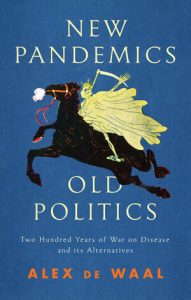In New Pandemics, Old Politics: Two Hundred Years of War on Disease and its Alternatives, Alex de Waal offers a new political history of epidemics, identifying and critiquing a repeated mobilisation of the ‘war metaphor’ of pandemic disease to show our persistent (mis-)framing of biological illness. The book is an extremely comprehensive and fascinating history of previous epidemics, their metaphors and manifestations, and a highly thought-provoking read in our current times, writes Hannah Farrimond.
New Pandemics, Old Politics: Two Hundred Years of War on Disease and its Alternatives. Alex de Waal. Polity. 2021.
 Find this book (affiliate link):
Find this book (affiliate link): ![]()
Alex de Waal both starts and finishes his new book by outlining the challenge of writing about an ongoing pandemic; details date, policies change and recommendations look naïve. Despite this disclaimer, however, de Waal’s New Pandemics, Old Politics holds up remarkably well to the current historical waves of COVID-19 because, in identifying and critiquing the ‘war metaphor’ of pandemic disease, he has touched on something enduring about our persistent (mis-)framing of biological illness.
This book is essentially a political history of epidemics, with a whole heap of lessons for today. De Waal’s basic thesis, outlined in Chapter One, is that using a war metaphor story, which starts with an invading pathogen which has to be fought on the ‘front-line’ and is eventually solved by a medical miracle such as drugs or a vaccine, is misguided. Metaphorical thinking is prevalent in times of crisis; we clutch at coherent stories to make sense of chaos. War metaphors are also favoured by those who fancy themselves as ‘Great Leaders’, as a way of subjugating competing political, scientific and business forces and as a method of controlling the narrative.
De Waal points out, however, that metaphors affect what we think and do. The military metaphor facilitates actions that would be inappropriate in peace-time. One, for example, is the pressure for consensus; dissenting or alternative voices are seen as detrimental to the ‘war effort’. Similarly, the need to act as one nation, rather than selfishly, is hammered into the population. Intrusive or surveillance measures are justified in war. Those advocating for democracy and social justice can be positioned as ‘saboteurs’ if they dissent. Finally, the war on disease narrative is also a ‘script for conquest’ (11), a colonisation of the world through Western biomedicine which is not sensitive to either human contexts or the natural world.

Photo by Mika Baumeister on Unsplash
Having laid out his primary thesis, de Waal then proceeds to analyse major chapters in the history of epidemic disease, particularly cholera, influenza, HIV/AIDS and Pandemic X (an imaginary ‘Big One’), pulling out their political and narrative significance. Giving each of the epidemics a character, he describes cholera as a pantomime villain: naïve, gross and savage in its effects on the human body (Chapter Two). Cholera represents the start of the war metaphor, through the ‘battle’ of Robert Koch, the German microbiologist whose triumphant discovery of the cholera bacillus put to rest, once and for all, competing theories of transmission.
However, the story of the war metaphor is not a simple one. In Chapter Three, de Waal shows that in many ways, the influenza pandemic of 1916-18 does not follow the triumph of the typical war against disease. Characterised as ‘The Joker’ who played the deadliest pandemic trick ever, it arrived, unexpectedly, at the end of World War One, killed between 60-100 million people, and left, lacking any triumphant medical victory. The more interesting question, for de Waal, is why this story is so quietly told: perhaps through collective shock, a lack of fit with the optimism of the American Roaring Twenties or its representation as a failure of science which took decades to isolate and vaccinate against it. The reason remains unclear.
The ongoing story of HIV/AIDS, in Chapter Four, is also more complicated than your average war metaphor can capture. HIV/AIDS is described as a ‘shadow’, invisibly transmitted, waiting often years or even decades to emerge in its more fatal form. De Waal writes extensively about the long history of HIV/AIDS viral development, and its entwined history with colonialism, for example, through the mobilisation of immigrant workers away from families, creating the necessary ‘webs of sexual interaction’ which drive HIV/AIDS. De Waal also identifies ‘the activism of gay men that made AIDS exceptional and created an entirely new model of emancipatory public health’ (136), such as through campaigning for inclusive policies, changing trial protocols and shaming pharmaceutical companies into lowering the price of anti-retroviral therapy drugs, reconfiguring HIV into a different type of chronic illness entirely. HIV/AIDS is thus not an ‘outbreak’ story in the classic mode, having neither a clearly defined beginning nor end, and containing a multiplicity of other stories within it.
Reading these chapters provides many lessons in relation to COVID-19. I was put in mind, during the cholera chapter, of contemporary debates about whether COVID-19 is aerosolised or primarily droplet-based, and the profound implications for public health of this knowledge. The story of influenza reminds us that people’s responses can tend as much towards collective forgetting as remembrance. There are clear parallels between the emancipatory public health of HIV/AIDS and the activist-led movements to medically recognise Long Covid. De Waal’s book is most valuable as a tool for making us think through today.
Indeed, de Waal’s last chapter is on COVID-19. In some ways, what de Waal says when he gets to the ongoing pandemic is relatively limited, because as he himself acknowledges, policy recommendations would date. This does mean, however, that we cannot really see what removing the war metaphor would look like. This difficulty, of what to do instead, is not a problem unique to de Waal. Susan Sontag, in her classic text Illness as Metaphor, states that medicine should avoid metaphors when speaking about disease, but that doesn’t really take us anywhere, given both authors have established the human need for stories. One suggestion de Waal does make is that we might develop an emancipatory public health, which is less focused on individual pathogens and more on the conditions in which such pathogens flourish: particularly social injustice, and our own (unhealthy) manipulation of the natural world. He is, of course, correct: we created the conditions in which COVID-19 is now flourishing and our lack of preparedness, well-articulated in the Pandemic X chapter of this book, is acute. That does not tell us, however, what to do today.
The other fly in the ointment of de Waal’s theory is that, unlike some of the epidemics he details in this book, such as influenza and HIV, it looks very much like COVID-19 will conform to the classic ‘outbreak’ storyline: in the endgame of medical vaccines. The emergence of medicine’s ‘silver bullet’ is going to reinforce the war story, not challenge it. Politicians are already using vaccine saviour stories to block out other less palatable ones.
For me, the book provoked thinking about WHY we are still stuck on war metaphors to describe our tricky social problems: we have had ‘The War on Drugs’, ‘The War on Poverty’ and ‘The War on Terror’. Even climate change has to be fought. Perhaps it is a question of who is using the metaphor. For example, less masculine and aggressive terminology, such as sports metaphors (the ‘Team of Five Million’), has been used to motivate action against COVID-19 in New Zealand by the female leader Jacinda Ardern.
To conclude, de Waal’s book is an extremely comprehensive, fascinating political history of previous epidemics, their metaphors and manifestations, and as such, a highly thought-provoking read in our current times.
- This article originally appeared at the LSE Review of Books.
- Please read our comments policy before commenting.
Note: This article gives the views of the authors, and not the position of USAPP– American Politics and Policy, nor of the London School of Economics.
Shortened URL for this post: https://bit.ly/3yng6JB
About the reviewer
Hannah Farrimond – University of Exeter
Dr Hannah Farrimond is a Senior Lecturer in Medical Sociology at the University of Exeter, UK. She investigates the psycho-social practices of legal substance use, in relation to tobacco/nicotine, alcohol and pharmaceuticals, in order to create greater visibility of ‘hidden addictions’ in policy and public spheres. Recent work is focused on Covid-19, stigma and public health.



